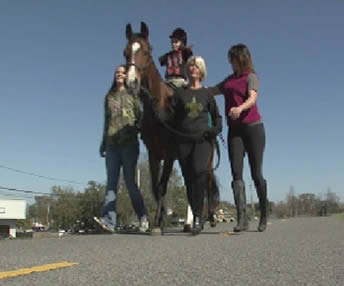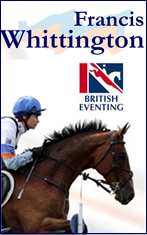
And photographs, if you have any.
Horseytalk.net Special Interview
Mardi Gras horses
Tuesday February 21 is Mardi Gras Day
 After the Carnival is over, the horses go back to helping patients living with physical, emotional and learning disabilities
After the Carnival is over, the horses go back to helping patients living with physical, emotional and learning disabilities
The next time you're on a parade route, you may recognize two Mardi Gras horses named Bear and Pinot.
They are Carnival veterans, skilled in leading Mardi Gras krewes. But away from the festivities, you'll find them playing a profound role, helping heal patients living with physical, emotional and learning disabilities.
Rebecca Downey is one of the beneficiaries of the riding lessons with the Mardi Gras horses. They're offered through the non-profit Greater New Orleans Therapeutic Riding Center.
The 34-year-old woman was born with Down's Syndrome. It's a genetic disorder that slows down an individual's ability to fully develop mentally. As a result, it's harder for her to process information. But talking to Rebecca, it is clear she processed her love for this program. "It's fun," she said on why she likes going to the classes.
Before Rebecca started her weekly riding lessons, her dad says she was shy, scared to socialize and unable to focus. Ten years later, with her dad always by her side, he says he's witnessed quite a turnaround in his daughter.
"She's learned to listen and focus and process what's she's learned. We think overall it's helped her able to cope with life more and be a little more independent," said Bill Downey, Rebecca's father.
Therapists say research shows individuals with learning disorders or cognitive disabilities are motivated to increase their concentration, patience and discipline when they ride horses.
Rebecca's long-time instructor says she sees that progress first hand with her students. "When you take a child out of a normal therapy situation or an indoor situation and you put them on to a living breeding animal, they want to participate more," said riding instructor Caye Mitchell.
Mitchell points to Allie Boetler as another prime example of the benefits of the therapeutic riding program. The five-year-old girl has a rare disorder called Cornelia de Lange Syndrome. As a result, she never fully developed physically or mentally, nor can she verbalize her thoughts.
Her personal caretaker, hired by her family, says she has seen firsthand what the disorder has done to many children. "A lot of these kids, we see them with helmets on because they're banging their head and they're just sitting in corners in wheelchairs," said Ruth Debelo, Allie's caretaker.
Debelo says Allie has defied the odds, in part because of her years of riding the carnival horse named Pinot. We're told, before she began riding eight years ago, she wanted to be held all the time. But that is no longer the case.
"We have seen the progress of her walking more and doing more on her own, going to get stuff for herself instead of us having to bring stuff to her," said Debelo.
Even more remarkable, she says Allie wasn't expected to live; now she's on her path to a better life.
"It has helped her increase her core strength. Her gait has improved. Allie went from not walking to walking and to walking incredibly, and that is keeping her alive."
Physical therapists say word is quickly spreading among parents about the benefits of therapeutic horseback riding programs. They're hearing that the progress is much faster with the help of horses, compared to traditional rehabilitation programs.
"The way the animal moves is so similar to the human walk that they found the input of the walk of the animal to the nervous system of the person that's on its back gives it the most normal input to the nervous system in the brain. The brain goes 'Aha, I remember that or I can relate to that,'" said Lorraine Jenkins, an occupational therapist who recommends patients to the program.
The perfect connection between the horses and the students has resulted in their muscles and core strength improving. In Rebecca's case, it also gave her a chance to learn how to ride in a Carnival parade. This year she rode in the Krewe of Carrollton parade.
Successes such as these are daily affirmations for the woman who started the nonprofit program 18 years ago, despite the struggle to keep it going. She only charges $25 per lesson. The rest of her maintenance money comes from donations.
"I can't not do it, because there is nothing else for some of these kids to benefit in this manner. For some of these riders, this is the one thing they have," said Anita Hartzell, the founder of the program.
She adds that most parents consider this a miracle because they never expected their children to do what they're doing on horseback.
It is something they acknowledged couldn't be accomplished without the gentle Mardi Gras horses. They patiently carry the students and do their routines without ever becoming agitated.
"I believe, with the patience that the horses show us, every time we put students or children on them -- the patience that they show, I believe they feel it. I believe they know they're helping those kids," said instructor Mitchell.
It is something the students' loved ones are eternally grateful for.
"It's given us pleasure, there's no question about it, to see her happy and see her be able to progress and develop lifestyle skills which will help her when we're no longer with her, because you know that day is coming soon." said Rebecca's dad.
"I think this program is wonderful for any handicap or disabled person," said Allie's caretaker.
Thanks to the help of these Mardi Gras horses, the caregivers say these patients are extending their dreams beyond the confines of their disability into a new and unexplored world.
Interview sourced from www.fox8live.com




